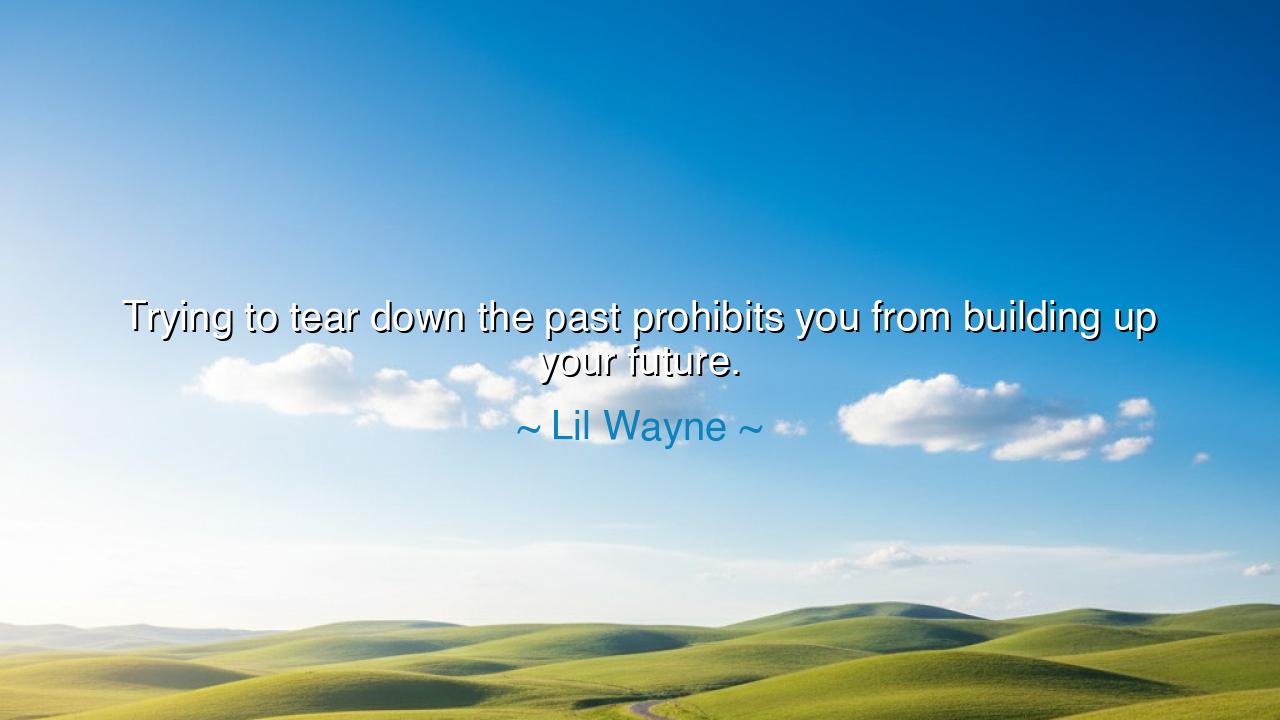
Trying to tear down the past prohibits you from building up your






Lil Wayne’s words, "Trying to tear down the past prohibits you from building up your future," convey a timeless lesson about the importance of embracing one’s history while forging ahead toward the future. In these few words, he encapsulates the essential idea that progress and growth are hindered when we focus too heavily on neglecting or rejecting what has come before us. The past—with its mistakes, triumphs, and experiences—shapes us, and while it may be tempting to focus only on the future, Lil Wayne’s insight reminds us that without accepting and learning from the past, we cannot truly move forward. The future is built not by disregarding the past, but by using it as the foundation upon which we can construct something new.
The ancients knew well the significance of honoring the past while striving to create a better future. In Greek philosophy, thinkers such as Socrates and Aristotle taught that to live a good life required reflection on one’s actions, both past and present. They believed that the past provided important lessons that, when understood, allowed the individual to grow and improve. Aristotle’s concept of virtue involved recognizing the moral choices of the past, using them as a guide to improve one’s future actions. To tear down the past, to deny it, was seen as a rejection of wisdom—an act that would only serve to trap a person in ignorance and prevent personal growth.
The Romans, too, understood that progress could not be achieved without learning from the past. Julius Caesar, a man of great ambition and military success, built his empire upon the lessons of previous military leaders. Yet, he did not dismiss the mistakes of his forebearers. Instead, he studied them, learned from them, and used that knowledge to expand his power. Caesar’s rise was rooted in a deep understanding of history, as he sought to learn from the past and avoid its pitfalls. His success was not simply due to his actions, but because he embraced the lessons the past had to offer, enabling him to build a future far greater than what he had inherited.
Similarly, Nelson Mandela’s journey from prisoner to president of South Africa is a story that demonstrates the necessity of embracing the past to create a better future. Mandela’s time in prison was not just about surviving the present—it was about reflecting on the history of apartheid, understanding its roots, and finding ways to build a nation founded on reconciliation and unity. His ability to accept his painful past, to forgive and learn from the mistakes of both his enemies and his own people, allowed him to lead South Africa toward a brighter future. His wisdom came from his willingness to not tear down the past but to use it as the basis for healing and progress.
In contrast, those who attempt to tear down the past without learning from it risk repeating the same mistakes. The history of failed revolutions is replete with examples of societies that sought to erase their past, only to fall into the same cycles of oppression and failure. The French Revolution, for example, while initially driven by the desire for freedom, sought to violently erase the past, resulting in the Reign of Terror and the rise of Napoleon, a dictator. By ignoring the lessons of history, these movements lost the very wisdom that could have led them to true and lasting change. Lil Wayne’s insight reminds us that we cannot build a future by disregarding the past—it is only through understanding and integrating it that we can create something meaningful.
The lesson here is profound: the past is not an anchor to hold us down, but a tool to help us rise. Every experience, every mistake, and every success contributes to the foundation of our future. Tearing down the past only weakens us, as we erase the wisdom and resilience that lie within it. The key to progress and growth lies in acceptance of the past, learning from it, and using it as a launchpad for creating a better future.
In our own lives, we must embrace our history—not as a burden, but as a resource. Whether it is personal struggles or collective experiences, the past holds the key to our future potential. Instead of seeking to escape or deny it, let us reflect on it with honesty and gratitude, extracting the lessons that will guide us toward a brighter tomorrow. The future does not come from rejecting what was—it comes from building upon it, learning from it, and using it as the bedrock for all that we wish to create.






AAdministratorAdministrator
Welcome, honored guests. Please leave a comment, we will respond soon